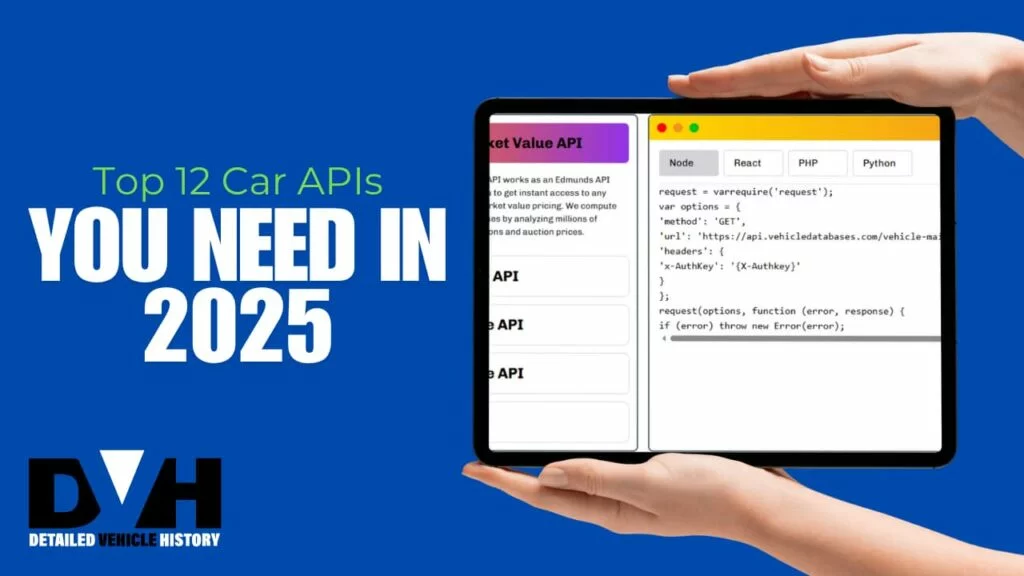Today, more data is available on cars, trucks, motorcycles, and all vehicle types than ever before. We’re talking about detailed specifications, historical data, theft records, accident records, maintenance records, license plate recognition, electric vehicle data, and more.
Thanks to car APIs (Application Programming Interfaces), automotive industries and developers can pull vehicle data from the right sources at any time without the need for manual, time-consuming research.
But what are the top car APIs every auto business needs? In this list, we’ve rounded up 12 of the most useful APIs to help you get accurate data for your business needs at any time.
Why Use Car APIs in 2025?
As the automotive data market grows past $153.5 million globally, using APIs ensures your business stays agile, automated, and future-ready.
Car APIs allow easy data transfer and communication between applications, reducing manual intervention and minimizing errors. With APIs, the automotive industry can easily access and utilize complex vehicle data from manufacturers, government agencies, auction houses, repair shops, and other sources.
By integrating these APIs, businesses can:
- Speed up development by pulling accurate vehicle data without building complex systems from scratch
- Enhance user experience with accurate specs, history, and images.
- Improve decision-making with access to market value, auction results, and maintenance records
- Reduce fraud and errors by verifying VINs, license plates, and ownership history
- Support electric and alternative vehicles with up-to-date EV specs and charging data
- Automate processes like insurance quoting, vehicle listing, and repair tracking
In short, car APIs make building smarter, more reliable automotive products easier and help stay competitive in a fast-changing industry. Now, let’s take a look at our top CarAPI suggestions.
Top 12 Car APIs For Automotive Businesses
The top 12 auto APIs for businesses are:
1. Vehicle VIN Decoder API
The VIN Decoder API is the foundation of almost every vehicle-related application. It takes a standard 17-digit VIN (Vehicle Identification Number) and returns decoded information based on official manufacturer and registry data.
VIN decoding is essential for identifying the correct vehicle, especially in automotive marketplaces, insurance quoting systems, and vehicle registration tools. Without this API, verifying the authenticity and details of every vehicle becomes time-consuming and error-prone.
Practical Applications
- Dealerships can provide accurate vehicle data by decoding the VIN.
- Auto listing platforms verify vehicle details from sellers
- Fleet systems keep track of every vehicle with the VINs
2. Vehicle Specifications API
The vehicle specifications API serves as the car make and model database for every vehicle. This API has access to in-depth technical data for millions of vehicles, and data can be culled using either VIN or a year/make/model input.
The vehicle specifications API makes it easy to retrieve data on:
- Power and performance
- MSRP and other vehicle prices
- Dimensions and safety features
- Wheels and tires
- Engine configuration and horsepower
- Transmission type and gear count
- Exterior and interior dimensions
- Drivetrain type (FWD, AWD, RWD)
- Fuel economy, tank size, and emissions
- Seating capacity, cargo volume, and more
Practical Applications
- Comparison apps that help users pick the right car based on their needs
- Rental and leasing companies managing diverse inventories
- Car dealerships and online marketplaces can provide buyers with accurate specs
3. Vehicle history API
A vehicle history API is one of the top-rated APIs today. It gives information about a car’s past, helping businesses and buyers avoid hidden problems and potential liabilities. With the VIN lookup API, auto business owners can access and provide information about:
- Previous accidents and damages
- Title branding (salvage, rebuilt, flood damage, lemon)
- Odometer rollbacks
- Ownership changes
- Theft records and lien checks
- Vehicle usage records
- Open recalls, and more.
Practical Applications
- Dealerships checking used vehicles before resale
- Marketplaces displaying full reports to buyers
- Auto auctions providing detailed vehicle records before auctions
- Financial institutions validating collateral
- Online vehicle history check sites can provide accurate records to consumers
4. OCR API
The OCR API (optical character recognition) provides advanced scanning technology for capturing and reading VINs and license plates from images and documents, making your systems smarter and more advanced.
By analyzing uploaded images (like a photo of a dashboard, title, or registration), this API can identify and extract VINs and license plate numbers even from handwritten or scanned documents.
OCR eliminates the need for manual entry and helps power mobile inspections, roadside services, and more.
Practical Applications
- Mobile apps that scan VINs from windshields or documents
- Vehicle check-in systems at rental companies and parking lots
- Law enforcement agencies for easy vehicle data retrieval
- Used car websites and dealerships accessing the value of vehicles using scanning technology.
5. Market value API
Top online valuation tools use market value database for vehicles to provide accurate market value based on vehicle condition. The car value API delivers dealer retail value, trade-in value, and private-party value ranges based on factors like VIN, mileage, location, and condition.
With accurate pricing, lenders, insurers, and marketplaces can easily determine the true value of all vehicles.
Practical Applications
- Car buying and selling platforms offering trade-in estimates
- Loan providers assessing vehicle depreciation
- Used car dealers and classified car websites can set accurate prices based on vehicle condition
6. License Plate API
With the License Plate API, you can retrieve vehicle data using only a plate number and state. This API requires a license plate number and state as input and returns key details such as the VIN, vehicle make, model, and year.
This API serves as an alternative to the VIN decoding API, especially if your customers are more prone to having only the license plate accessible. It’s ideal for quick lookups during roadside checks, parking enforcement, and mobile app registrations.
Practical Applications
- Used car dealerships can improve inventory management with quick license plate checks, especially during trade-ins.
- Law enforcement or repo services identifying vehicles in the field
- Rental check-in and checkout tools
7. Vehicle Image API
A vehicle image API accesses several databases to provide actual images of all vehicles. Based on a VIN or year/make/model input, this API returns multiple image angles, including front, rear, side, interior, and wheel views.
The car image API can even return images by trim level and color when available.
Practical Applications
- Auto dealers uploading inventory to marketplace sites and ad listings
- Mobile apps displaying vehicle previews
- Valuation tools matching images with reports with the help of the vehicle images API
8. Sales History API
The Sales History API tracks past sales transactions for a specific vehicle based on its VIN. This API provides information on how often the vehicle has changed hands, when and where it was sold, and through what channel (e.g., dealership, private sale, lease return).
It adds context to a vehicle’s value, showing trends like frequent ownership changes, possible flipping, or long-term usage with high-quality images.
Practical Applications
- Dealerships identifying trends in trade-ins
- Marketplaces providing up-to-date information on listings with high-quality images
- Insurance companies can use the API to determine the resale value of specific vehicles and calculate premiums.
9. Auction History API
The auction history API provides detailed records of vehicles sold through auctions, both wholesale and salvage. It pulls auction data such as sale date, price, lot number, auction location, and condition. Depending on availability, it may include damages, images, and seller information.
Practical Applications
- Dealers can avoid buying vehicles with bad auction history
- B2B car resellers screening inventory
- Auto exporters reviewing purchase sources
- Insurance platforms checking salvage history
10. Motorcycle Data API
Vehicle APIs are not limited to cars alone. A motorcycle data API brings the same robust data coverage to two-wheelers that API providers have for cars and trucks. The API provides model-specific data for motorcycles, including engine specs, transmission type, weight, top speed, fuel economy, and safety data.
With this API, sellers and developers in the motorcycle niche can easily access all the information and specifications to improve sales and get better traffic.
Practical Applications
- Motorcycle dealerships offering detailed listings
- Marketplace apps supporting powersports
- Insurance providers calculating rates based on accurate bike specs
- Vehicle history report providers adding detailed specs to reports
11. Vehicle Maintenance API
The Vehicle maintenance API provides information about the manufacturer’s recommended maintenance schedules at mileage intervals.
It returns a list of recommended services based on mileage and age, such as oil changes, brake inspections, timing belt replacements, and more. Combined with a service history API, businesses can also access past repair records of all vehicles.
Practical Applications
- Maintenance apps reminding users of upcoming services
- Dealerships checking service gaps before resale
- Fleet platforms monitoring upkeep across vehicles
12. Electric Vehicle Specifications API
The Electric Vehicle (EV) Specifications API focuses specifically on battery-powered vehicles, offering specs not found in standard vehicle data. It returns data such as:
- Battery size and range (EPA, WLTP)
- Charging time (Level 1, 2, DC fast)
- Wheels and tires specifications
- Dimensions and capacity
- Motor output and torque
- Charging connector types and compatibility
- Regenerative braking and thermal management systems
As EVs continue to gain market share, having accurate EV-specific data is essential for marketplaces, apps, and charging networks.
Practical Applications
- EV comparison tools and buyer guides
- Charging apps recommending compatible stations
- Fleet electrification tools measuring suitability
Insight Begins with Data: How To Get Started with APIs
Over 80 million vehicle records, data spanning 1900–2025, and 25+ APIs make Vehicle Databases a leading automotive data provider. They deliver fast, accurate, and scalable vehicle data to power dealerships, insurance providers, and automotive applications across the industry.
Their APIs are RESTful and return data in JSON format for easy integration. With comprehensive documentation, code samples, and sandbox environments, developers can get started in minutes.
They even offer free credits to test all APIs and give demos so you can be sure of each API before committing. To get started, visit Vehicle Databases and create an account. You will instantly receive free credits to explore as many APIs as you want.
Conclusion
Car APIs make it easier to build better, smarter automotive tools. From decoding VINs to checking vehicle history and showing real images, these APIs save time and boost accuracy. If you want to stay ahead in 2025, start using the right APIs to power your apps, websites, or services. Get started with Vehicle Databases free car API credits today.








